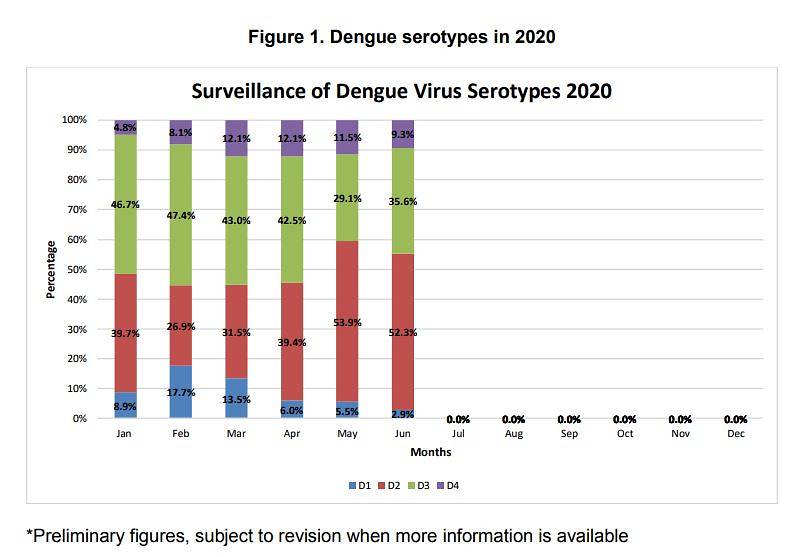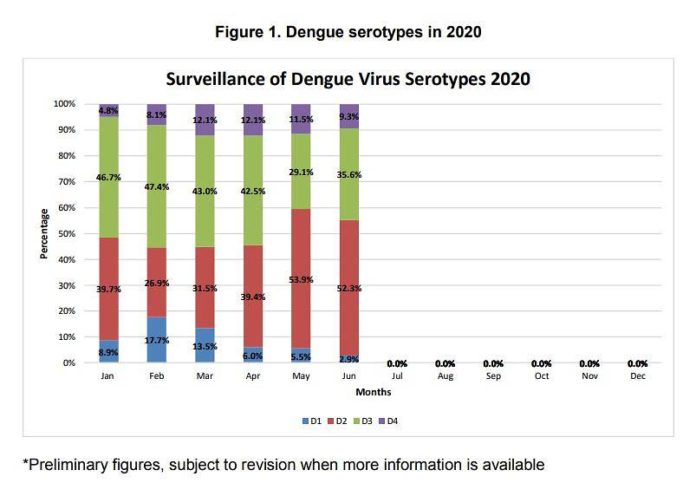SINGAPORE: Singapore’s tally of dengue cases this year reached a record 22,403 on Wednesday (Aug 5), the highest recorded in a single year.
With nearly five months to go before the end of the year, the number of dengue cases has surpassed the 22,170 recorded in 2013, which was the previous largest dengue outbreak in Singapore.
In all, 20 people have died from dengue this year as of Aug 2, said the Ministry of Health (MOH). The youngest victim was 25 years old, while the oldest was 92 years old.
Eighteen of the victims had worked or lived in active dengue clusters. MOH declined to provide details on the victims or the dengue clusters they had worked or lived in.
The ministry said that about 0.2 per cent of the dengue patients this year developed dengue haemorrhagic fever, a more severe form of dengue that can be fatal. The proportion of dengue haemorrhagic fever cases has ranged between 0.1 and 0.8 per cent in the past 10 years.
“Although most dengue patients recover from the infection, elderly patients and those with concurrent medical conditions are at higher risk of developing complications. We urge persons with symptoms suggestive of dengue to see a medical practitioner for timely diagnosis and management,” said MOH.
Singapore has reported more than 1,000 dengue cases a week for eight consecutive weeks. Last week, the National Environment Agency (NEA) reported 1,380 dengue cases, down slightly from the weekly high this year of 1,792 cases for the week ending Jul 25.
Before this year, the highest number of dengue cases recorded in a week was 891 in 2014.
READ: Commentary: Record dengue cases complicates Singapore’s fight against COVID-19
MORE THAN 390 ACTIVE DENGUE CLUSTERS
NEA said there were 391 active dengue clusters in Singapore as of Tuesday, with more than 600,000 households located in those areas.
The largest clusters are around Aljunied Road/Geylang Road and Arthur Road near Katong.
Warmer weather and rainy days since the beginning of this year have favoured mosquito breeding across the country, said Associate Professor Luo Dahai from Nanyang Technological University’s Lee Kong Chian School of Medicine.
The “circuit breaker” period imposed by Singapore between Apr 7 and Jul 1 to stem the spread of COVID-19 also likely exacerbated the dengue situation. During the circuit breaker period, non-essential workplaces and schools were shuttered and people were told to stay home.
“When more people stay at home all the days, there could be more residential mosquito breeding and more opportunities for ‘blood meals’,” said Assoc Prof Luo.
READ: Construction firms rely on on-site workers, pest control companies to prevent mosquito breeding during circuit breaker
In the first quarter of the year, there was an increase in the less common dengue virus serotype 3 (DENV-3). This serotype was last prevalent about three decades ago in Singapore, meaning there is low immunity in the population and rapid disease transmission, said NEA.
Assoc Prof Luo explained that DENV-2 has been the dominant strain circulating in Singapore since 2016.
“The local outbreaks are usually caused by DENV-1 and DENV-2 in the past. The immunity built among the community residents against these DENVs may not be protective against the emerging DENV-3. More symptomatic dengue infection cases may rise for this reason,” he said.
VIRUS SEROTYPES “FLUCTUATING”
However, NEA’s quarterly surveillance data showed that from April to June, the proportion of DENV-3 cases had fallen while that of DENV-2 rose.
Assoc Prof Luo said that while there are more DENV-3 viruses circulating in Singapore than in the past, the two virus serotype populations are fluctuating.
“We would need to monitor the serotypes for a longer period to see a clearer trend, whether DENV-2 is back to dominant or there is going to be a shift to DENV-3,” he said.

He added that while vector control measures implemented by NEA do help to control the mosquito propagation, climate change may cause an epidemic cycle every two to three years. Overall, dengue cases are also on the rise across the world, he said.
NEA urged those living in dengue clusters to help step up efforts to protect themselves against dengue, including spraying insecticide in dark corners of their homes, applying insect repellent regularly and wearing long pants and long-sleeved tops.
“As the traditional dengue peak season lasts a few months, from May to October, NEA urgently seeks the cooperation of all residents and stakeholders to do their part to complement NEA’s efforts,” it said.
NEA has continued with its intensified dengue inspection and outreach efforts, and conducted more than 552,000 inspections islandwide between January and July this year, it said.
It had said previously on Jul 24 that it was working with all town councils to step up dengue prevention efforts in an intensive two-week exercise.





